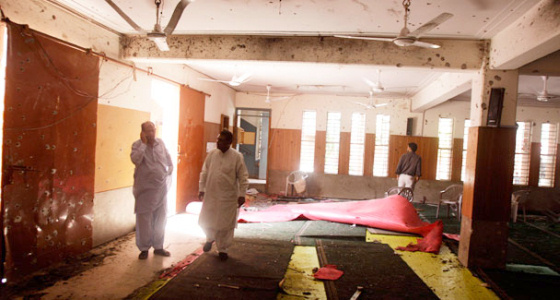Daily Dawn, Pakistan | From the Paper > Editorial
Culture of intolerance
Editorial
Sunday, 30 May, 2010
Editorial
Sunday, 30 May, 2010
Officials visit the Garhi Shahu mosque which was stormed by militants on Friday, in Lahore, on Saturday, May 29, 2010. - Photo by AP.
Friday’s gruesome attacks on Ahmadi worshippers in Lahore were a tragic reminder of the growing intolerance that is threatening to destroy our social fabric. Bigotry in this country has been decades in the making and is expressed in a variety of ways. Violence by individuals or groups against those who hold divergent views may be the most despicable manifestation of such prejudice but it is by no means the only one. Religious minorities in Pakistan have not only been shunted to the margins of society but also face outright persecution on a regular basis.
Take the police force, which is notorious for terrorising the poor. Even within that section of society, however, it reserves its harshest treatment for non-Muslims, for the simple reason that brutal or coercive acts directed against minorities are even less likely to get policemen into trouble. There is no shortage of more insidious means of discrimination either. To this day many job applications require candidates to state their religion. Has the irrelevance of this query never struck the organisations in question, or is it part of a screening process designed to weed out ‘undesirables’? Now let’s venture down to the basic building blocks of society, from institutions to households. In many middle-class and affluent Muslim homes, separate eating utensils of distinctly poorer quality are reserved for domestic staff. But there’s more: a further distinction in entitlement is made between Muslim and non-Muslim employees.
None of this is surprising in a country whose statute books are riddled with discriminatory laws, where jingoism is drummed into the heads of schoolchildren and where radio and television talk show participants can casually state that “we are all Muslims here in Pakistan”, which is patently not the case. This is a country where a non-Muslim cannot, by law, become president or prime minister. The blasphemy laws continue to be abused to settle personal scores, evade debts owed to non-Muslims and to grab their land by forcing them to flee in the face of violence. The state, meanwhile, remains largely unmoved by the plight of minorities — and that isn’t surprising either for it is a party to this persecution.
Tackling the terrorists who kill almost at will isn’t the only job at hand. The culture of intolerance has become ingrained in Pakistan and wide-ranging measures are required to change our collective mindset. Textbooks need to be revised and the perils of both brazen and covert narrow-mindedness must be publicly debated. It would also help if major religious parties came forward to condemn atrocities such as Friday’s attacks on Ahmadis in Lahore. But that is perhaps asking for too much.
Take the police force, which is notorious for terrorising the poor. Even within that section of society, however, it reserves its harshest treatment for non-Muslims, for the simple reason that brutal or coercive acts directed against minorities are even less likely to get policemen into trouble. There is no shortage of more insidious means of discrimination either. To this day many job applications require candidates to state their religion. Has the irrelevance of this query never struck the organisations in question, or is it part of a screening process designed to weed out ‘undesirables’? Now let’s venture down to the basic building blocks of society, from institutions to households. In many middle-class and affluent Muslim homes, separate eating utensils of distinctly poorer quality are reserved for domestic staff. But there’s more: a further distinction in entitlement is made between Muslim and non-Muslim employees.
None of this is surprising in a country whose statute books are riddled with discriminatory laws, where jingoism is drummed into the heads of schoolchildren and where radio and television talk show participants can casually state that “we are all Muslims here in Pakistan”, which is patently not the case. This is a country where a non-Muslim cannot, by law, become president or prime minister. The blasphemy laws continue to be abused to settle personal scores, evade debts owed to non-Muslims and to grab their land by forcing them to flee in the face of violence. The state, meanwhile, remains largely unmoved by the plight of minorities — and that isn’t surprising either for it is a party to this persecution.
Tackling the terrorists who kill almost at will isn’t the only job at hand. The culture of intolerance has become ingrained in Pakistan and wide-ranging measures are required to change our collective mindset. Textbooks need to be revised and the perils of both brazen and covert narrow-mindedness must be publicly debated. It would also help if major religious parties came forward to condemn atrocities such as Friday’s attacks on Ahmadis in Lahore. But that is perhaps asking for too much.
©2010 DAWN Media Group. All rights reserved
URL : www.dawn.com/wps/wcm/connect/dawn-conte...-of-intolerance-050-hh-12
URL : www.dawn.com/wps/wcm/connect/dawn-conte...-of-intolerance-050-hh-12









